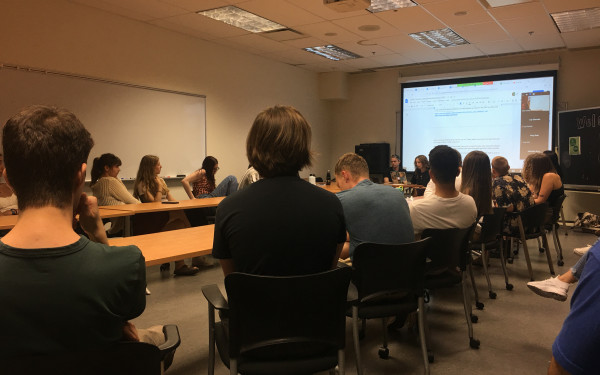Whose Space Is It Anyway?
Geography Student Society May Seek Accreditation to Be Guaranteed an Office
An ongoing tug of war between the university and the geography student association may lead the student group to campaign for accreditation next semester.
An empty 11-square-metre office in the geography department will become the new space for the associations representing geography and urban planning students if the university has its way.
At the beginning of the semester, the Geography Undergraduate Student Society asked the university for permission to use the empty space for a student-run café. The idea was turned down for logistical reasons—there’s no running water in the room—and GUSS was told it would have to move to that room, along with the Urban Planning Association.
Together, the two associations have 14 executive members, more than an office of that size can hold at once. Within a few months, GUSS’s aspirations for the new social spot turned into a battle to keep their old one, a more spacious room above the TD Bank on Guy St.
“We would like the GUSS executive office to be more welcoming to students and give you the opportunity to hang out there and use the resources that we have,” said Pete Johnson, GUSS’s vice-president of social affairs, speaking to geography students at a general meeting.
GUSS meant to discuss these issues at its general assembly last week but failed to gather enough people to meet quorum. The students that were present unofficially voted to keep their association’s current office space in the TD building in addition to the smaller office the university is trying to move them to.
But if pressed to choose between the two, there was a preference for keeping the smaller office on the same floor as the rest of their department. The room in the Hall building was GUSS’s office back when the executive team was smaller. Then they were moved to TD, which is a bigger office but is far removed from the students they represent.
“The initial reason we got displaced to the TD Bank [building] is that there was no space for a prof that was coming in,” said Johnson. Now the association is concerned that another incoming professor will keep moving their office around the campus or that they’ll lose their space entirely.
GUSS executives want to keep the office above the TD bank, which they already share with the UPA, because they say it’s more inviting to students who want to study there. The association even planned to purchase a new computer and software for students to use.
According to GUSS executives, the university has implied they will rent out the TD office when the student groups are gone. This is a financially logical decision considering student associations don’t pay rent, but the university has no official plans as of yet.
The story of asking to use empty rooms and losing them in the process is all too familiar to Iman Hassanein.
“Space has been a problem since my mom went to Concordia,” the chemistry student said.
Hassanein, president of the biochemistry and chemistry student association, hasn’t had an office since she brought the group back to life last year. The defunct physics association offered to share their unused space, but when Hassanein checked in officially with Concordia, the department decided to give the office to their Teaching Assistant coordinator instead.
“There’s just no space. We just don’t have a lot of space in the chemistry department,” she said. “It’s just a fact.”
Hassanein and four other executives from the Association of Biochemistry and Chemistry Undergraduate Students (ABACUS) represent 500 students and are currently based out of a student locker.
“We have a banner, a bunch of documents we have to keep; some companies try to call us and we have to keep it all in a locker,” she said.
Having been absent in recent years, the association needs to work on building trust and interest among their membership. Right now Hassanein says any attempt at getting feedback through email has been unsuccessful and not having a stable meeting place doesn’t help.
“We still run as normal, but whenever someone has a question, we tell them we have to meet in a café,” said Hassanein. Most of her call-outs, like ideas to put forward at the upcoming Student Congress, for example, go unanswered.
Now ABACUS is working on merging with the dissolved physics association and getting a space back in the physics department, where space seems to be more attainable, according to Hassanein. This means writing new bylaws, a new constitution and electing new members to have physics undergrads represented.
But the ABACUS president isn’t completely discouraged. She says there is still a possibility of working with the Arts and Science Federation of Associations (ASFA), the umbrella organization of groups in the Faculty of Arts and Science, to use their office on the Loyola campus. But first they need to wait for by-elections.
Since ASFA’s Loyola representative resigned, with upcoming by-elections to elect a new one, ABACUS hasn’t been able to coordinate anything with the Loyola office. She hopes that will change after elections.
Hassanein also points to the case of Concordia’s engineering and computer science student societies. When the university decided to give them a space that made more sense for students, they were given a whole annex on Bishop St. For years, engineering and computer science groups and students have had access to a lounge complete with a foosball table, conference room and numerous offices.
“They won the space lottery,” said Hassanein.
There are also recent successes by the Journalism Student Association, which got their own office last year, and the School of Community and Public Affairs Student Association (SCPASA), which was accredited recently, guaranteeing them an office space.
Although accreditation guarantees a space for SCPASA, there is always the possibility that the university moves them to another office. And the same goes for GUSS.
“It’s not that if we get accredited we get to keep the space,” said Pete Johnson from the geography student association. “It’s if we get accredited we get owed a space.”
But accreditation can only begin in January, and the university has made it known that GUSS will have to move during the winter exam period, leaving them very few alternatives.
A university spokesperson could not be reached by press time for comment.

_900_567_90.jpg)


_600_375_90_s_c1.jpg)


_600_375_90_s_c1.jpg)